As Food Allergy Awareness Month comes to an end, we want to celebrate #FoodAllergyChampions!
This month we focused on anaphylaxis education and awareness. We want to highlight a few individuals and organizations who have helped increase the availability of epinephrine through stock epinephrine programs. Stock epinephrine refers to epinephrine auto-injectors that are not prescribed to a particular person and can be used in an emergency.
Public spaces and community settings
Ontario city has stock epinephrine available in public places
In 2014, the City of Hamilton, ON initiated a stock epinephrine pilot program that provided Jackson Square Mall security staff with stock devices to use in an emergency; the staff were trained by Food Allergy Canada. The pilot was the first stage of a larger undertaking to have stock epinephrine in additional public spaces.
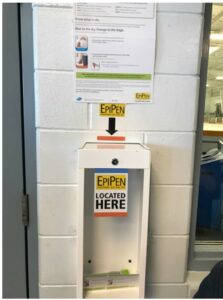
This initiative was spearheaded by local rotary club members Dr. Frank Stechey, Marty Schure and former City Councilman, Lloyd Ferguson. Together they put forward a motion to support the stock epinephrine program to honour 12-year-old Maia Santarelli-Gallo from Stoney Creek, who tragically died in 2013 from an anaphylactic reaction during an outing with family and friends at Burlington’s Mapleview Shopping Centre.
The rotary members’ goal was to ensure the availability of life-saving medication in public areas to help avoid future tragedies. Today, all city-owned facilities in Hamilton, including recreation centres, arenas, YWCA-senior centres, and community halls have stock epinephrine on hand.
We applaud the efforts of the city of Hamilton for their commitment to safety and supporting those with food allergy. Their work has provided a model for other jurisdictions to follow and demonstrates that local municipalities can make a difference in their own communities.
Saving lives with stock epinephrine in New Brunswick

Kelly Dunfield, a nurse practitioner, initiated a stock epinephrine pilot project in 24 public sites in Sussex, New Brunswick. Each site received an alarmed wall cabinet containing two epinephrine auto-injectors, an adult dose and a child dose, and had an educational session on recognizing and responding to anaphylactic reactions. Within a few months of the pilot’s launch, a life was saved.
Since the pilot, an increasing number of public venues across Canada and in the U.S. have shown interest in stock epinephrine, and Dunfield set up a company to accommodate demand for wall cabinets which store stock epinephrine auto-injectors. Locations now include schools, universities, daycares, recreation centres, churches, healthcare facilities, fire departments, and the list continues to grow.
Schools and campuses
Protecting students in Alberta
Protecting students with food allergy is a shared responsibility between educators, parents and the medical community.
Thanks to Alberta MLA Ms. Jackie Armstrong-Homeniuk, students are now better protected in publicly-funded Alberta schools after she brought forth Bill 201 – Protection of Students with Life-Threatening Allergies Act which came into effect in January 2020. This law incorporates proven strategies for maintaining schools as safe and welcoming places for children with food allergy. Publicly funded school boards are required to create an anaphylaxis policy that includes:
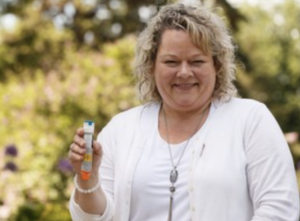
Photo by Ian Kucerak/Postmedia
- Strategies to reduce the risk for all students with potentially life-threatening allergies
- A communication plan for the school community
- Mandatory training for school staff
- Identifying students with life-threatening allergies and keeping information about their allergies
- Stock epinephrine – an epinephrine auto-injector (e.g. EpiPen®) not prescribed to a specific individual and can be used in an emergency
This Alberta bill is the first in Canada to require stock epinephrine in each school for emergency use. Thank you to Ms. Armstrong-Homeniuk for putting this Bill forward and for her leadership in progressing this Bill into legislation quickly and efficiently. We worked closely with her staff on this initiative.
As a part of our long-term comprehensive school program initiative to build informed and supportive communities, we are advocating to ensure safe learning environments for all students. This includes consistent medically-reviewed training on the condition, management plans in place for all affected students, and unassigned epinephrine devices (stock epinephrine) for the treatment of anaphylaxis.
Student-led emergency response team carries epinephrine auto-injectors
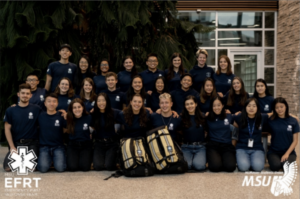
At McMaster University in Hamilton, Ontario, a group of student volunteers are a part of the Emergency First Response Team (EFRT) which provides emergency medical services on campus. Team members carry medical equipment and life-saving medication such as epinephrine (e.g., EpiPen®) in their packs; they are trained to recognize the symptoms of a severe allergic reaction (anaphylaxis). We spoke to a member of the EFRT executive team to learn more about their group and other student-led teams.
University departments collaborate on a stock epinephrine program

The University of Victoria launched its stock epinephrine program in 2018; the idea for one was proposed by Nicole Fetterly, RD, who was the campus dietitian at that time. Given her role in Food Services and support of students with food allergy, it seemed prudent to have a program in place to help manage anaphylactic reactions on campus.
Three departments – Food Services, Student Health, and Campus Security – came together to form the program. Campus Security team members were trained on recognizing anaphylaxis and the use of epinephrine to treat anaphylaxis, and had access to epinephrine auto-injectors, both adult and child doses. Nearly five years later, the program has continued and the stock devices have been used in various emergency situations.
Public service
Peel Regional Police in Ontario have epinephrine auto-injectors at all their facilities
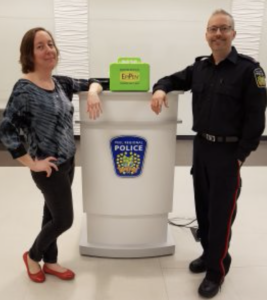
As Peel Regional Police continue to prioritize public safety, they’re hoping an initiative they started to further ensure that safety catches on with other police services – the initiative: having stock epinephrine auto-injectors (i.e., EpiPen®, ALLERJECT® and Emerade®), in all their facilities. Stock epinephrine means having epinephrine auto-injectors that are not prescribed to anyone and can be used in an emergency.
We had the opportunity to speak to Peel Regional Police Constable Ashley Kimlin, and Peel Regional Police Occupational Health Nurse Alexis Silverman to learn more!
Epinephrine auto-injectors on board all fire trucks in Mississauga, Ontario
In 2013, Mississauga Fire and Emergency Services introduced its EpiPen® Program, making it one of the first to have EpiPen® auto-injectors on board all fire trucks. Mississauga Fire Chief John McDougall had noted, “As firefighters, our priority is to protect life. Having the EpiPen Program in place is crucial for us when we’re first on the scene responding to a severe allergic reaction.”
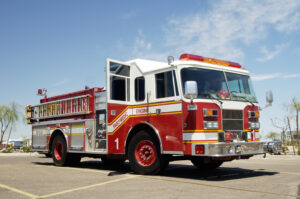
Having epinephrine on hand to treat anaphylactic reactions can help save lives, and we acknowledge the efforts of Mississauga City Council and long-time community advocate Debbie Bruce for bringing forth this important initiative.
This program has inspired other communities to follow its lead and have this life-saving medication as part of their first aid equipment.
